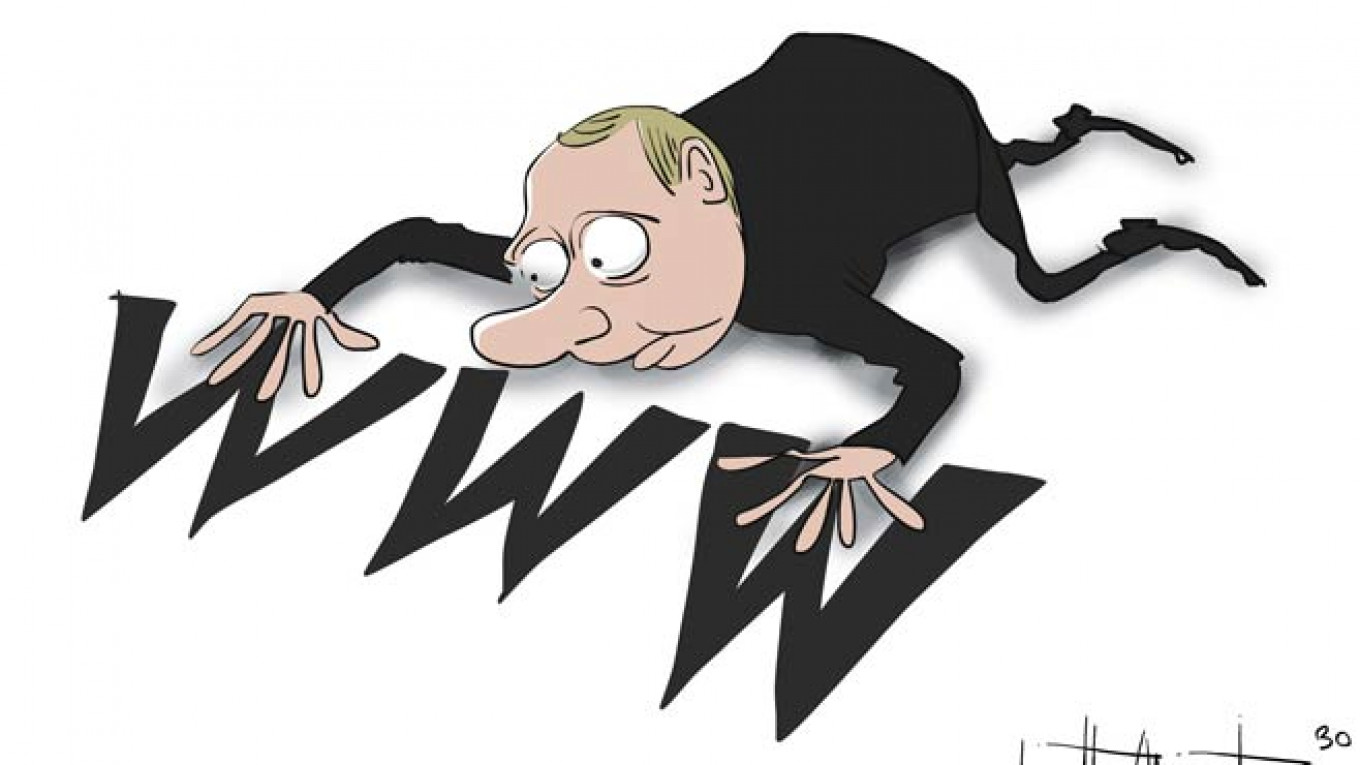President Vladimir Putin, who had previously shown complete indifference to the Internet, has suddenly given an exhaustive explanation of his position on the subject. It has thus become clear that on key issues, Putin remains the same mid-level KGB officer that he was in the late 1980s.
In response to a question from a "Russian blogger" at the Media Forum in St. Petersburg on April 24, Putin said that "the Internet first appeared as a special CIA project," and although it later went on the open market, it was "initially a military program, a special program, and special services are still at the center of things."
'..in [Putin's] simplistic world view, the Internet was and remains a special project of U.S. intelligence.'
Andrei Soldatov
Putin did not stop there. After making these broad generalizations, he launched an attack against Russian Internet businesses. Relatively few countries in the world have managed to create national search engines that can compete with Google but thanks to Yandex, Russia is one of them. At the Media Forum, Putin noted that when Yandex started out, "they were forced to have a certain number of Americans and Europeans on their management team, remember? And they had to agree to this." The president thus suggested that the company had fallen under Western control. As a result of his words, the shares of Russia's largest Internet companies quickly plummeted on NASDAQ. Those suffering the greatest losses include Qiwi, the national electronic payment system, Mail.ru, the national e-mail service, and Yandex, which ultimately lost more than $1 billion.
Investors' concerns are understandable, given the situation with another famous Russian Internet project, the Vkontakte social network. Its founder, Pavel Durov, was forced out of the company and ultimately decided to leave the country altogether, citing political pressure.
However, there is one major inconsistency here: if Putin cares so much about Russia's national interests on the Internet, shouldn't he support national companies rather than undermine their business?
That same contradiction runs through all of Russia's Internet policy.
On one hand, Kremlin officials have developed a multi-faceted strategy for changing the rules of how the global Internet operates in Russia. It involves using revelations about NSA electronic surveillance programs to promote ideas of "national sovereignty" on the Web by establishing virtual borders. It calls for using various international venues such as the International Telecommunication Union or the Netmundial forum that just concluded in San Paulo, Brazil to undermine the position of U.S. nongovernmental organizations responsible for managing the Internet. It includes Russian legislation to "ground" such global platforms as Google and Facebook on Russian territory. The first step in that process was taken when State Duma deputies passed a law requiring all Internet services operating in Russia to store their data on Russian territory — effectively opening up a "back door" that Russia's intelligence agencies can use to access those global companies. And finally, it is a game in which Moscow granted political asylum to NSA leaker Edward Snowden and then capped off that ploy by allowing him to address a question to Putin during his annual live call-in show. Snowden used the opportunity to force the president to explain the Russian position on mass surveillance.
On the other hand, this complex, multi-faceted strategy is coupled with Putin's belief of how everything is actually structured. It turns out that, in his simplistic world view, the Internet was and remains a special project of U.S. intelligence.
There is no room for details or gray areas in this world view: it does not discriminate between the military and intelligence agencies. Time plays no role: if a certain relationship existed 30 years ago, those ties must still exist today. Neither does it define the nature of relationships: if two individuals or groups are linked in some way, it makes no difference who controls whom.
Perhaps the clearest example of how this approach is flawed is the nature of the two most popular conspiracy theories in Russia. The first claims that Osama bin Laden blew up the Twin Towers on Sept. 11, 2001 by order of U.S. intelligence because both he and the CIA supported the mujahedeen back in the 1980s. Supporters of the second theory believe that Chechen warlord Shamil Basayev blew up an apartment building in Moscow, organized the Dubrovka Theater hostage siege and the Beslan school siege at the instruction of Russian intelligence agencies because both he and they supported the Abkhazian side in the Georgian-Abkhazia conflict in 1992.
Many specialists have noted how Soviet-era intelligence agencies combined operational sophistication with glaring analytical weakness. It is no coincidence that the KGB's analytical department was only created in 1989. Prior to that, Communist Party bosses did not permit the chekists to engage in intelligence analysis. Even former Soviet leader Yury Andropov, who is much revered by the KGB, would filter that agency's reports through his personal advisers — recruited from every possible sphere but the KGB.
Two weeks ago, Duma Deputy Yevgeny Fyodorov surprised the Russian public by announcing that the CIA had composed the songs of the popular rock band Kino — a belief he based on statements made by people who had served in the KGB in the 1980s. Now we see that Putin, who also served in the KGB in the 1980s, believes in similar theories — a fact that only makes Russian policy even more unpredictable.
Andrei Soldatov is an intelligence analyst at Agentura.ru and co-author of "The New Nobility: The Restoration of Russia's Security State" and "The Enduring Legacy of the KGB."
A Message from The Moscow Times:
Dear readers,
We are facing unprecedented challenges. Russia's Prosecutor General's Office has designated The Moscow Times as an "undesirable" organization, criminalizing our work and putting our staff at risk of prosecution. This follows our earlier unjust labeling as a "foreign agent."
These actions are direct attempts to silence independent journalism in Russia. The authorities claim our work "discredits the decisions of the Russian leadership." We see things differently: we strive to provide accurate, unbiased reporting on Russia.
We, the journalists of The Moscow Times, refuse to be silenced. But to continue our work, we need your help.
Your support, no matter how small, makes a world of difference. If you can, please support us monthly starting from just $2. It's quick to set up, and every contribution makes a significant impact.
By supporting The Moscow Times, you're defending open, independent journalism in the face of repression. Thank you for standing with us.
Remind me later.








